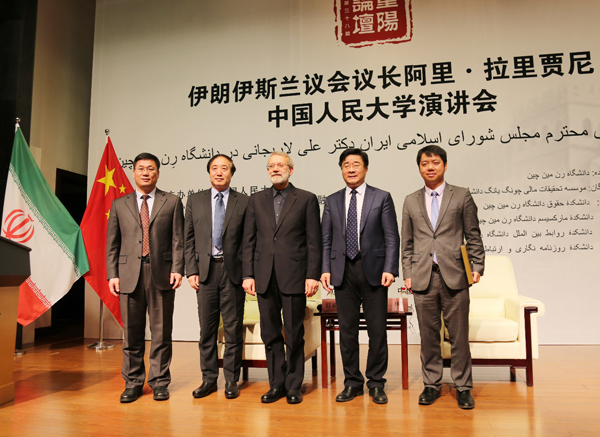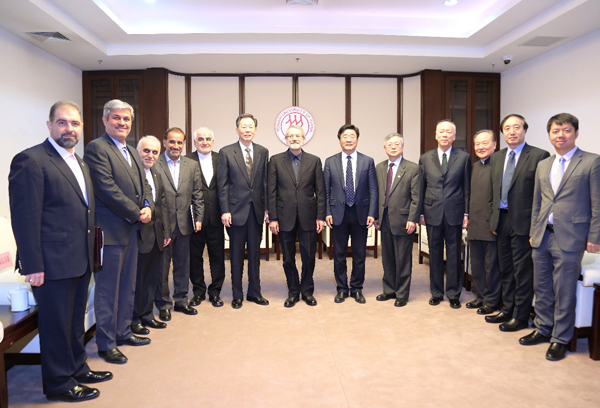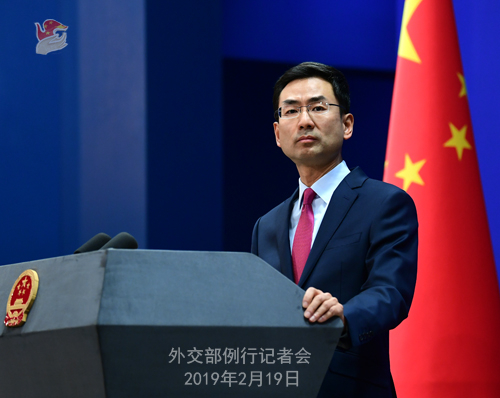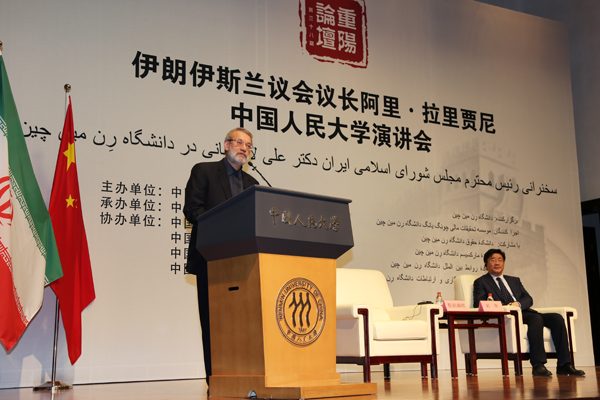Major Power Relations
Your Present Location: PROGRAMS> Major Power RelationsWang Peng: China-Iran to deepen strategic trust and cultural exchanges
By Wang Peng Source: CGTN Published: 2019-2-21

Both China and Iran have strong wills to deepen their mutual strategic trust, as Chinese Foreign Minister Wang Yi and his Iranian counterpart Javad Zarif reconfirmed in the meeting in Beijing on Tuesday.
A high-ranking delegation came at a strategic time
At this strategically meaningful moment, a luxury high-ranking delegation came to Beijing from Teheran directly. This 40-top-official team includes Iranian Islamic Parliamentary Speaker Dr. Ali Larijani, Foreign Minister Mohammad Javad Zarif and a dozen of ministers and vice-ministers in energy, petroleum, transportation, finance, the CEO of Iranian central bank, and so forth.

An Iranian delegation led by Iranian Islamic Parliamentary Speaker Dr. Ali Larijani (7th L) has visited Renmin University of China, Beijing. /Photo by RDCY.
As the international media predicted, the major purpose of this visit was to preserve the 2015 nuclear deal, which was signed by the U.S. in Obama’s era but was abandoned by Trump Administration last year.
In November 2018, the U.S. re-imposed oil and economic sanctions against Iran; later, John Bolton, U.S. National Security Adviser, threatened more sanctions would follow.
Apparently, in Iran’s eyes, this Trumpian “withdrawal” was “driven by pathological obsession”; and hence any attempts to reimpose sanctions on Iran again are illegal and unacceptable.
In the circumstances, Iran considers the comprehensive strategic partnership with China as one of their most important relations - “(Iran-China Relations) is very valuable to us”, as Minister Zarif underlined. At the same time, Li Zhanshu, the Chinese National People’s Congress Chairman met his Iranian counterpart Larijani in separate talks. Iranian delegators also had a meeting with other Chinese officials.
China’s standpoints on the Iran deal and unilateral sanctions are clear and consistent. As the foreign ministry spokesman Geng Shuang claimed, “We have always opposed unilateral sanctions and long-arm jurisdiction.” This position has been reaffirmed and stressed during this visit.

Foreign Ministry Spokesperson Geng Shuang’s remarks on the regular press conference, February 19, 2019. /Photo from Ministry of Foreign Affairs of the People’s Republic of China.
What should be noticed is that China is not alone in this affair. Last month, a barter-type system known as INSTEX was set up by France, Germany and Britain to allow businesses to skirt direct financial transactions with Iran, in order to evade possible U.S. sanctions, fell short of commitments to save the nuclear deal.
China and Europe’s independent attitude toward Iran nuclear issue may encourage more states to reconsider their optimum strategy in this tough game of “cable wire walk” between the U.S. pressure and the lure of business opportunity in Iran.
Silk Road spirit and China-Iran educational cooperation
President Xi Jinping often cites the ancient Chinese saying that, “Amity between people holds the key to sound relations between states”. Harmony is built on the basis of mutual understanding and cooperation between people.
And among all tools, educational cooperation and exchange between young scholars and students may serve as the best approach to validate bilateral ties fundamentally.
In this regard, it is clear that Iranian guests quite agreed with Xi’s assertion above; and so, the delegation chose Renmin University of China (RUC) as their last destination to end this successful visit by meeting and chatting with a number of young and outstanding Chinese students.
Before delivering his keynote speech at Chongyang Forum, Dr. Ali Larijani sincerely thanked Renmin University of China for their longstanding and unremitting efforts in promoting China-Iran people-to-people exchange and cultural-educational cooperation.

Iranian Islamic Parliamentary Speaker Dr. Ali Larijani (L) is giving speech at Renmin University of China, Beijing. /Photo by RDCY.
He especially appreciated the newly established Silk Road School, and promised to recommend the “most promising Iranian young students” to study at the School, which runs a Master Program of Contemporary China Studies and plays a key role to actively support the China’s Belt and Road Initiative (BRI) in education with participating countries.
Prof. Liu Wei, the President of RUC thanked Dr. Larijani for his encouragement and promised to further RUC’s educational platform with its high-level think-tank resources to train future elite leaders for Iran and all friendly countries along the BRI. “Proper training will offer them a passion for Chinese culture, and help them understand profoundly the path and experience of China’s development”, as Liu introduced.
In conclusion, as Prof. Wang Wen, the Executive Dean of Chongyang Institute for Financial Studies at RUC summarized, this Iranian delegation to China has taken great opportunity to enjoy this in-depth strategic communication with their old friends and deepen the strategic trust between the two great nations.
We can ensure and expect to witness the fresh progress made in the bilateral comprehensive and strategic partnership between two splendid ancient civilizations and their co-rejuvenation in modern times.
Wang Peng is an associate research fellow at the Chongyang Institute for Financial Studies, Renmin University of China.























































































 京公网安备 11010802037854号
京公网安备 11010802037854号





